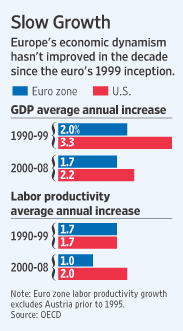
Source of graph: online version of the WSJ article quoted and cited below.
(p. A16) “The euro was supposed to achieve higher productivity and growth by bringing about a deeper integration between economies,” says Simon Tilford, chief economist at the Centre for European Reform, a London think tank. “Instead, integration is slowing. The lack of flexibility in labor and product markets raises serious questions about the likelihood of the euro delivering on its potential.”
Structural changes are the last great hope in part because euro zone members have few other levers for lifting their economies. Individual members can’t tweak interest rates to encourage lending, because those policies are set by the zone’s central bank. The shared euro means countries don’t have a sovereign currency to devalue, a move that would make exports cheaper and boost receipts abroad.
The remaining prescription, many economists say: chip away at the cherished “social model.” That means limiting pensions and benefits to those who really need them, ensuring the able-bodied are working rather than living off the state, and eliminating business and labor laws that deter entrepreneurship and job creation.
That path suits Carlos Bock. The business-studies graduate from Bavaria spent months navigating Germany’s dense bureaucracy in order to open a computer store and Internet café in 2004. Before he could offer a Web-surfing customer a mug of filter coffee, he said, he had to obtain a license to run a “gastronomic enterprise.” One of its 38 requirements compelled Mr. Bock to attend a course on the hygienic handling of mincemeat.
Mr. Bock closed his store in 2008. Germany’s strict regulations and social protections favor established businesses and workers over young ones, he said. He also struggled against German consumers’ reluctance to spend, a problem economists blame in part on steep payroll taxes that cut into workers’ takehome pay, and on high savings rates among Germans who are worried the country’s pension system is unsustainable.
“If markets were freer, there might be chaos to begin with,” Mr. Bock said. “But over time we’d reach a better economic level.”
Even in France, some erstwhile opponents of reforms are changing their tune. Julie Coudry became a French household name four years ago when she helped organize huge student protests against a law introducing short-term contracts for young workers, a move the government believed would put unemployed youths to work.
With her blonde locks and signature beret, Ms. Coudry gave fiery speeches on television, arguing that young people deserved the cradle-to-grave contracts that older employees enjoy at most French companies. Critics in France and abroad saw the protests as a shocking sign that twentysomethings were among the strongest opponents of efforts to modernize the European economy. The measure was eventually repealed.
Today, the now 31-year-old Ms. Coudry runs a nonprofit organization that encourages French corporations to hire more university graduates. Ms. Coudry, while not repudiating her activism, says she realizes that past job protections are untenable.
“The state has huge debt, 25% of young people are jobless, and so I am part of a new generation that has decided to take matters into our own hands,” she says. “We’ve decided that we can’t expect everything from the state.”
For the full story, see:
MARCUS WALKER And ALESSANDRA GALLONI. “Europe’s Choice: Growth or Safety Net.” The Wall Street Journal (Thurs., MARCH 25, 2010): A1 & A16.

